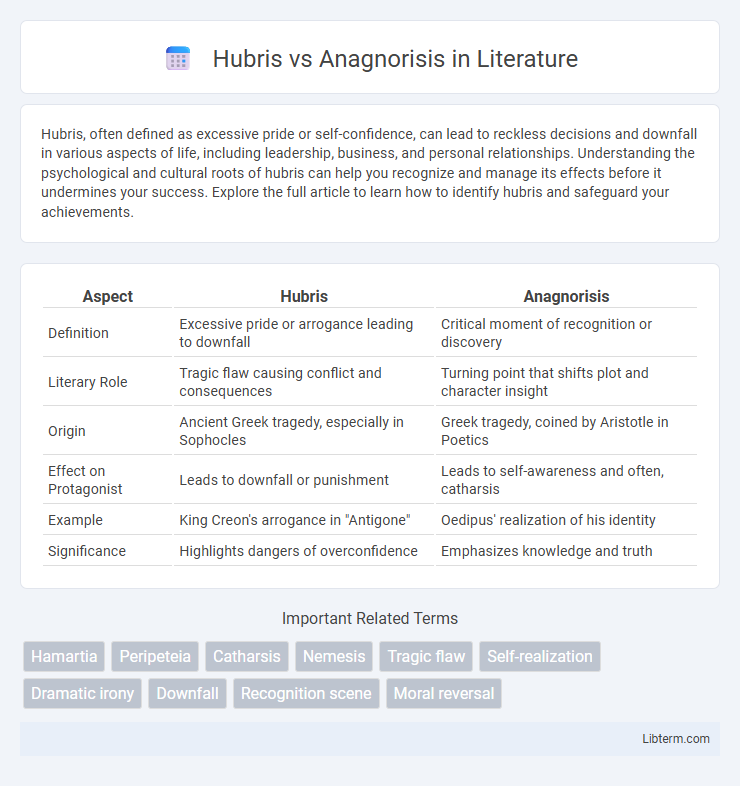Hubris, often defined as excessive pride or self-confidence, can lead to reckless decisions and downfall in various aspects of life, including leadership, business, and personal relationships. Understanding the psychological and cultural roots of hubris can help you recognize and manage its effects before it undermines your success. Explore the full article to learn how to identify hubris and safeguard your achievements.
Table of Comparison
| Aspect | Hubris | Anagnorisis |
|---|---|---|
| Definition | Excessive pride or arrogance leading to downfall | Critical moment of recognition or discovery |
| Literary Role | Tragic flaw causing conflict and consequences | Turning point that shifts plot and character insight |
| Origin | Ancient Greek tragedy, especially in Sophocles | Greek tragedy, coined by Aristotle in Poetics |
| Effect on Protagonist | Leads to downfall or punishment | Leads to self-awareness and often, catharsis |
| Example | King Creon's arrogance in "Antigone" | Oedipus' realization of his identity |
| Significance | Highlights dangers of overconfidence | Emphasizes knowledge and truth |
Introduction to Hubris and Anagnorisis
Hubris denotes excessive pride or self-confidence that often leads to a character's downfall in literature and drama, serving as a critical flaw in many tragic heroes. Anagnorisis represents the moment of critical discovery or recognition in a narrative, where a character gains profound insight into their true nature or situation. Together, these concepts drive the emotional and moral complexity of classical and modern storytelling by highlighting the hero's journey from ignorance to self-awareness.
Defining Hubris: The Seeds of Downfall
Hubris, defined as excessive pride or self-confidence, acts as the primary catalyst for a character's tragic downfall in classical literature and drama. This overweening arrogance blinds individuals to their limitations and inevitable consequences, setting the stage for irreversible failures. Rooted in defiance of divine or moral laws, hubris plants the seeds of ruin by provoking forces beyond human control.
Understanding Anagnorisis: The Moment of Realization
Anagnorisis represents a pivotal moment in literature where a character experiences a profound realization or critical discovery, often leading to a shift in their perspective or actions. This moment contrasts with hubris, which is excessive pride or arrogance that typically leads to the character's downfall. Understanding anagnorisis enhances the appreciation of narrative arcs by highlighting the transformation and growth that follows self-awareness.
Historical Context: Hubris and Anagnorisis in Greek Tragedy
Hubris in Greek tragedy refers to excessive pride or defiance toward the gods, often triggering a protagonist's downfall and reflecting ancient Greek societal values on humility and divine law. Anagnorisis signifies the moment of critical recognition or revelation, where the tragic hero gains essential knowledge about their true nature or situation, thereby intensifying the emotional impact of the narrative. These concepts, deeply embedded in works by playwrights like Sophocles and Aeschylus, illustrate the tension between human ambition and fate within the cultural framework of classical Greece.
Psychological Roots: Why Hubris Happens
Hubris often stems from psychological factors such as excessive pride, overconfidence, and a distorted self-perception driven by narcissism or ego inflation. This arrogance typically arises when individuals fail to recognize their limitations, leading to reckless decisions and a detachment from reality. Understanding the psychological roots reveals how cognitive biases and identity threats contribute to the illusion of invincibility that fuels hubris.
Famous Literary Examples of Hubris
King Lear's tragic downfall exemplifies hubris, as his excessive pride leads him to misjudge his daughters and lose his kingdom. In Mary Shelley's Frankenstein, Victor Frankenstein's hubris drives him to defy natural limits by creating life, culminating in catastrophic consequences. Similarly, Oedipus in Sophocles' play embodies hubris by attempting to escape his fate, only to fulfill the prophecy through his own actions.
Iconic Instances of Anagnorisis in Literature
Iconic instances of anagnorisis in literature vividly reveal moments of critical self-discovery that pivot the narrative's direction, such as Oedipus realizing his tragic origins in Sophocles' "Oedipus Rex." Shakespeare's "King Lear" illustrates profound anagnorisis when Lear acknowledges his blindness to loyalty and misjudgments leading to his downfall. These transformative realizations emphasize the interplay between human frailty and knowledge, underscoring the thematic depth of hubris and enlightenment in classical and modern narratives.
Hubris vs Anagnorisis: Key Differences and Interplay
Hubris refers to excessive pride or arrogance that often leads to a character's downfall, while anagnorisis signifies a crucial moment of recognition or realization that brings enlightenment or change. The key difference lies in hubris being a character flaw causing conflict, whereas anagnorisis is a transformational insight that can reverse or deepen the plot's trajectory. Their interplay drives narrative tension, as hubris precipitates crises that set the stage for anagnorisis, ultimately shaping the character's fate and thematic depth.
Modern Interpretations and Relevance Today
Modern interpretations of hubris emphasize the dangers of excessive pride and overconfidence in leadership, often linked to ethical failures and systemic collapse in political, corporate, and social contexts. Anagnorisis, as a moment of critical self-realization, is increasingly seen in contemporary storytelling and psychology as a powerful catalyst for personal growth and transformative change. Together, these classical themes remain relevant today by illustrating the consequences of unchecked ego and the redemptive potential of insight in navigating complex human experiences.
Lessons Learned: Applying Hubris and Anagnorisis in Real Life
Understanding hubris--the excessive pride leading to downfall--teaches the importance of humility and self-awareness in decision-making. Recognizing anagnorisis, or the moment of critical self-discovery, encourages individuals to reflect on mistakes and embrace growth. Applying these concepts in real life fosters resilience, improves leadership, and helps prevent repeated errors by promoting timely acknowledgment of flaws.
Hubris Infographic

 libterm.com
libterm.com